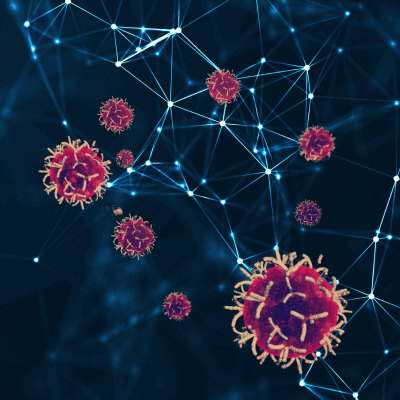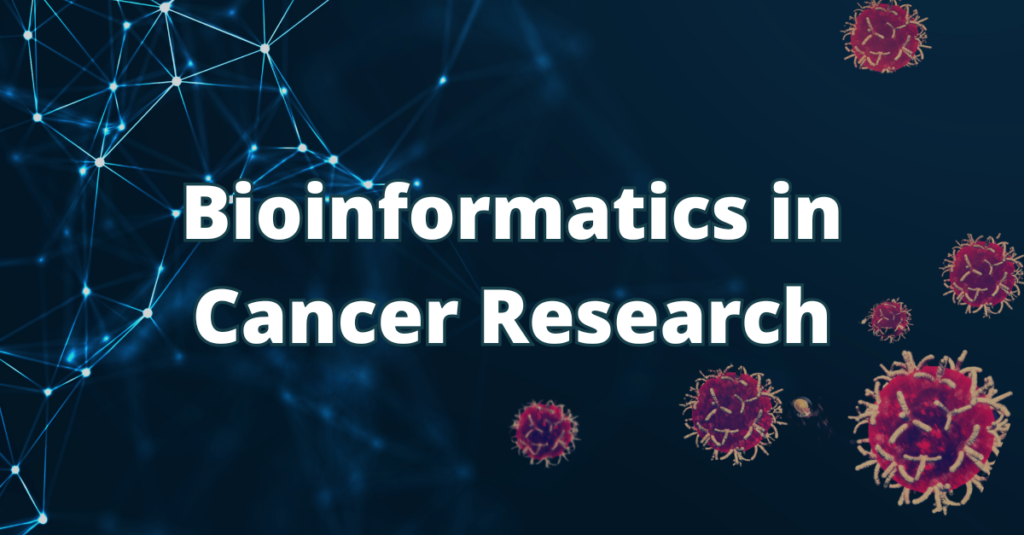Bioinformatics in Cancer Research – Published Examples
- 9th February 2024
- Posted by: Breige McBride
- Categories: Bioinformatics, Oncology

There are many applications of bioinformatics in cancer research. It can help with everything from evaluating the efficacy of cancer treatments, to identifying biomarkers associated with survival. As a bioinformatics analysis provider, we have supported a huge variety of cancer research projects. As a result, our work is acknowledged in many published cancer research studies. We share some of these below to provide real examples of bioinformatics analyses being applied in cancer research.
Bioinformatics in Cancer Research – Publication and Case Study Examples
Tumor Fusion Burden as a Hallmark of Immune Infiltration in Prostate Cancer
2020 – Marie-Claire Wagle, Joseph Castillo, Shrividhya Srinivasan, et al.
This study provides an example of bioinformatics playing a role in cancer research. Genentech set out to identify the role of Tumour Fusion Burden (TFB) on the prevalence and expression of key molecular and immune effectors in prostate cancer and whether TFB enhanced tumour immunogenicity.
Throughout the study bioinformatics enabled the integration, analysis, and interpretation of large-scale molecular data. This facilitated the identification of correlations and patterns that ultimately led to the conclusion that Tumour Fusion Burden may serve as a more suitable biomarker than Tumour Mutation Burden in identifying candidates for immunotherapeutic intervention in prostate cancer.
You can learn more about the role of bioinformatics in this study, in our case study.
Identifying baseline plasma biomarkers associated with survival in previously treated advanced hepatocellular carcinoma
2021 – Lorenza Rimassa, Robin Kate Kelley, Tim Meyer, et al.
As part of the global Phase 3 CELESTIAL trial, cabozantinib was used to treat patients with previously treated advanced hepatocellular carcinoma cancer (HCC), to investigate the efficacy of cabozantinib in previously treated advanced HCC patients.
Bioinformatics played a significant role in this cancer research clinical trial. Bioinformatics tools were used to analyse large-scale clinical trial data, specifically focusing on survival analysis models. These models allowed for the assessment of associations between plasma biomarker levels and survival outcomes in patients with HCC. Also, bioinformatics methods were used to create various survival analysis models, considering biomarker levels as dichotomous and continuous variables. As a result of these analyses, significant associations were found between plasma biomarkers and survival outcomes. These contributed to the trial’s findings that cabozantinib improved overall survival and progression-free survival compared to placebo across all baseline concentrations of the analysed biomarkers. In addition, potential favourable prognostic plasma biomarkers for survival in advanced HCC were identified. In future, these biomarkers could potentially inform HCC prognoses and treatment decisions.
You can learn more about the role of bioinformatics in this trial in our case study.
 Bioinformatics in Cancer Research – Publication Examples
Bioinformatics in Cancer Research – Publication Examples
Tumor ctDNA guiding adjuvant immunotherapy in urothelial carcinoma
2021 – Thomas Powles, Zoe June Assaf, et al.
Researchers conducted a randomized phase III trial of adjuvant atezolizumab versus observation in operable urothelial cancer, using circulating tumour DNA (ctDNA) as a biomarker to identify patients who had residual disease after surgery and were at high risk of relapse. The trial results show that patients positive for ctDNA had improved disease-free survival and overall survival when treated with atezolizumab compared to observation. This is another study which demonstrates an application of bioinformatics in cancer research, as transcriptomics analyses (supported by Fios Genomics) played a part in the study.
Transcriptomics analysis of tumour samples from ctDNA-positive patients revealed distinct gene expression patterns and molecular subtypes linked with response or resistance to atezolizumab. Transcriptomics analysis also showed that ctDNA-positive patients not relapsing on atezolizumab had higher levels of immune response signatures and basal–squamous gene features. In contrast, patients who did relapse had higher levels of angiogenesis and fibroblast TGFβ signatures.
You can learn more about this research here.
Development of a gene expression-based prognostic signature for IDH wild-type glioblastoma
2020 – Radia M. Johnson, Heidi S. Phillips, Carlos Bais, et al.
This publication contains another example of bioinformatics in cancer research. The article details the development of a gene expression–based prognostic signature for IDH wild-type glioblastoma. The authors used data from 3 independent cohorts of patients. Bioinformatics analyses were conducted on the data to identify a set of 30 genes to act as a prognostic signature to stratify patients into 3 risk groups with different survival outcomes. This involved unsupervised clustering, differential expression analysis, and survival analysis. The signature was then validated in 2 external cohorts and showed superior performance to other clinical and molecular factors.
You can learn more about this research here.
Bioinformatics Support for Your Cancer Research Project
If you are looking for bioinformatics support for a cancer research project then we can help you. Over 30% of the projects Fios Genomics provides bioinformatics analyses for are oncology research projects. Our team have extensive experience in analysing pre-clinical and clinical cancer research datasets. What’s more, we can integrate your in-house research data with publicly available datasets to produce robust results. If you would like to find out how we can support your particular cancer research with bioinformatics, then contact us today!
Author: Breige McBride, Content and Social Media Manager, Fios Genomics
Reviewed by Fios Genomics Bioinformatics Experts to ensure accuracy
See Also:
Bioinformatics Analyses for Cell and Gene Therapy Research
Bioinformatics and the Pharmaceutical Industry

